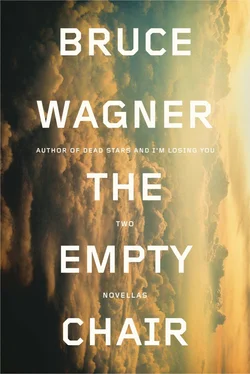“Do you know how the body of the saintly Hermit was discovered? In the cave, on its knees before the chair, in eternal obeisance. My grandson was thus honored to discover the Beloved One poised in the bardo between this life and the Pure Land, and came running in a lather. We went back together; and that was where I saw him, his elegant, attenuated fingers frozen in a caress upon the approximate metatarsals of his unseen master! For Ramana Maharshi did say, ‘The real feet of Bhagavan exist only in the heart of the devotee’… During the extraordinary conference I keep referring to, the Hermit poignantly avouched — it was the first time I ever saw the tears of a saint! — that he had been the first to descry the body of his teacher, in Bombay, the difference being that unlike the posture of the American in death, the Great Guru had taken full possession of the chair, like the pilot of a ‘great vehicle’ come home. Twas the Great Guru’s fate to launch himself into the Unknowable from the chair, that prosaic cynosure whose indifferent ‘thereness’ (the exacting word used by the Hermit), analogous to Infinity itself, had been polished by thousands of satsang sittings as a stone smoothed by the sea, transformed into psalm and song. The Hermit was unbashful to inform that while it was his teacher’s destiny to be carried to Silence in a golden throne, it was his own to be liberated by traveling alongside the Great Guru in the guise of supplicant, a pilgrim forever ‘at his feet’ in service and surrender. He said that in the end, whether one sat in the chair or kneeled before it, was a thing governed by stars and individual temperament, and one was not better than the other.
“The Hermit insisted your arrival was an omen that his Earthly cycle had ended. I’m afraid I’m being clumsy… he said it so much simpler! But hear me out — for this next is of ultimate importance . When Guruji told you his cave chair was the ‘second guru,’ it was naught but an impish lie that he couldn’t resist in the moment, because you were so incensed — like a charging bull! He knew you weren’t ready to hear the Truth. So he made that impish remark to defuse, but (as things turned out) had no time to rectify it — until now — through me. What he did not have the chance to impart was… the second guru was you! You were that teacher who comes along (if one is so blesséd) to make sense of the first— you were the one who illuminated all that the Great Guru had tried to show him, which he never fully understood. This knowledge only came to him in the final weeks of his life…
“How magnificent, he said, is God and his workings!
“He asked me to convey his words as best I could and to thank you by proxy. I hope to Krishna you will deign to send a reply through Mister Quasimodo, one hell of a guy, so at least I may know the letter found its mark! All of my life I have adapted to failure but could not go quietly to my grave knowing this memo had never been delivered…”
Shit — I’m getting a headache! Probably not a good idea to read by candlelight, huh?
Queenie set the pages down and closed her eyes, looking within. She rubbed the bridge of her nose then used both hands to rub her temples. Someone brought a pill and she swallowed it with a gulp of wine. She lit a cigarette and inhaled deeply, closing her eyes again.
Can I paraphrase the rest? The letter closed with a heartfelt apology to “Sri Bela” for not having treated him as justly deserved. The elder regretted he’d been unable to comprehend earlier that Kura was “also a saint who walked amongst us. For who else but a saint might have the power to mean so much— everything! — to one as glorious as the jnani ? To have been the catalyst to freedom… and to top it off, to meet him at journey’s end so he might properly return to Mother’s arms! Who else but a fellow traveler could effect this?” He even asked (in the diffident way one asks of a soothsayer) if there was any meaning to his grandson finding the body in the cave — was it a sign the boy himself might become a saint? He proclaimed he’d been twice-blessed by God for arranging the divine intersection of his meager life with that of Kura and the Hermit’s, then wrapped things up by extending a “standing room invitation.” “The Dashir Cave shall be up to snuff within the month, jewel-hearted one! It awaits you, as do we all! We are forever in your debt and at your service!”
O — I almost forgot. And this is pretty good. He wrote that the theft of the chair — he didn’t quite use that word but something thereabouts — ah yes, “purloined”! He used purloined —he said, “After my talk with the Hermit, your action made eminent sense.” Or something like that. I’ll read it to you tomorrow when I can see straight… the gist of it being, he drew enormous comfort knowing the chair was back in Kura’s possession, “restored to its rightful place in the lineage of Kings.” What he couldn’t have imagined was that having that chair felt like a curse; that’s how Kura described it in his diary. So he set about what was to become a final chore.
He retrieved the curiosity from the closet, unpacked it, and set it opposite his desk, as if awaiting a visitor. He decided that the only way to make things right — to lift the curse, I suppose — was to return that which did not belong to him. The sole person fit for the assignment was Quasimodo, who not only was well familiar with the village and its obscure location but more importantly had a warm relationship with the elder. His wishes were to be taped to the chair in the form of two notes; one addressed to “Mr. Q,” and a second to Justine, Kura’s secretary, informing her that the courier was to receive a $25,000 bonus upon verification the deed was done.
After outlining the plan in his journal, Kura collapsed and died.

I make it a habit never to go to funerals.
Our long goodbye ended in Delhi — Lordy, he looked so fine in his blue serge suit! Besides, I had no desire to be in Paris on a rainy Thursday, stranded and bereft. Do you know the Vallejo poem?
I will die in Paris, on a rainy day,
on some day I already remember…
Isn’t that lovely?
And that’s the end of my story.
— O! Good question. The answer is, my name and address had literally been glued to one of the diaries, along with a proviso that all volumes be forwarded to me upon his death. I suppose he must have had a presentiment. I guess there wasn’t anyone in his life he felt closer to… and I feel really honored by that.
I’ve only recently begun to dip into the journals from the late ’70s/early ’80s, after Kura returned from Bombay to Paris. O man, he was completely at sea. He was using, heavily. Coke and heroin — his health was really going to shit. (He had the heart attack in ’92.) As always, he had an amazing network of friends. Jodorowsky, of course. Karl Lagerfeld, Olivia de Havilland. And there was Genet… That surprised me — I didn’t think anyone knew Genet. And I don’t know how it happened, but he met Carlos Castaneda. In Paris. Castaneda was one of his heroes. They had lunches and dinners over a month’s time. And there was this rather astonishing conversation Kura transcribed that foreshadowed the American’s remarks at Dashir Cave. Evidently, Castaneda told him the same thing: that it was imperative to have a second teacher! Castaneda said that his second teacher was Death; that Death helped him untangle everything he’d been taught by the Yaqui Indian sorcerer Don Juan Matus. It interested me that Kura wrote about Castaneda kind of upbraiding him. Castaneda admonished that Death had been Kura’s first teacher — I’m not sure exactly what Kura had divulged about his violent past — and seemed to chastise him for never having understood “a single word Death was saying.” Can you imagine? He wrote that Castaneda said something like, “Death taught you everything and you understood nothing! When you find that second teacher, be sure to give him your full attention. The second teacher will tell you— show you — what was on Death’s mind.” When I read the passage, I wondered if Kura had completely forgotten about it, even after the American had said as much.
Читать дальше













